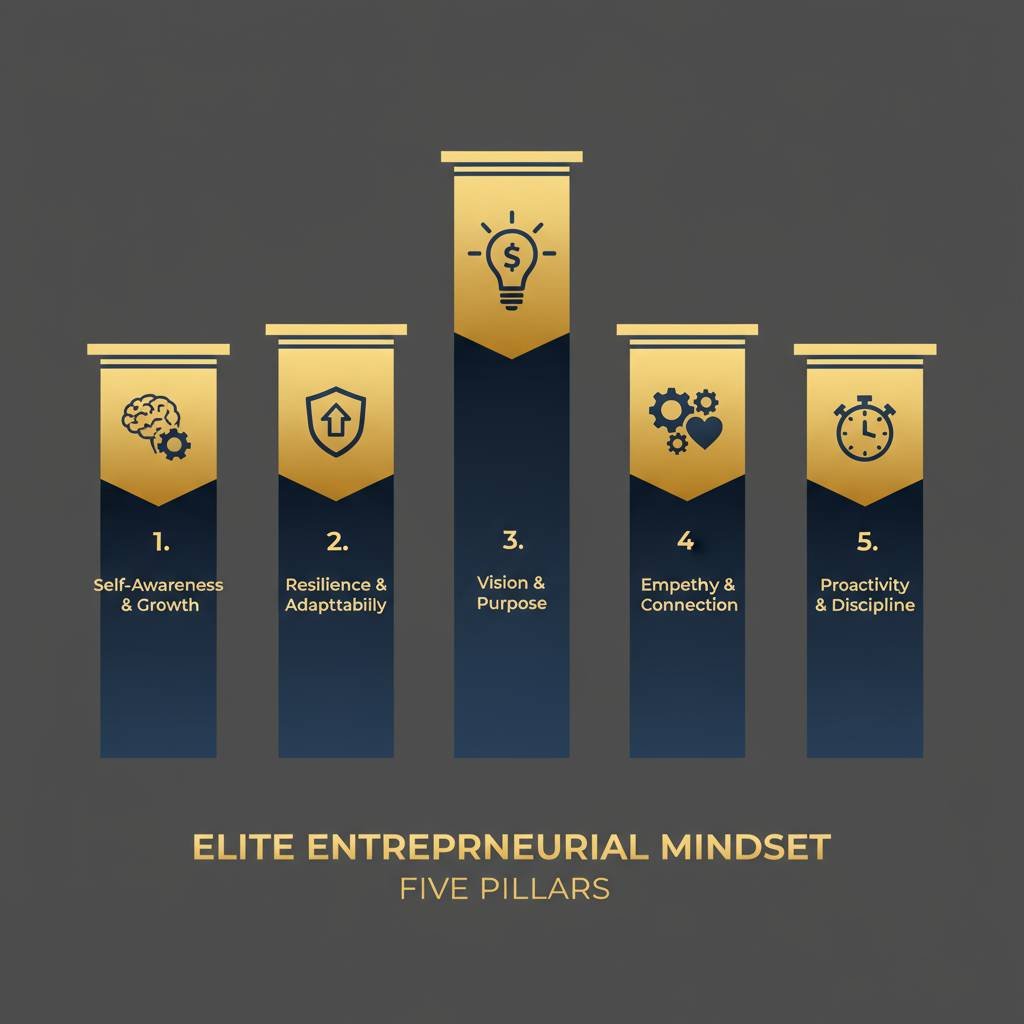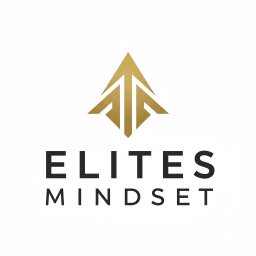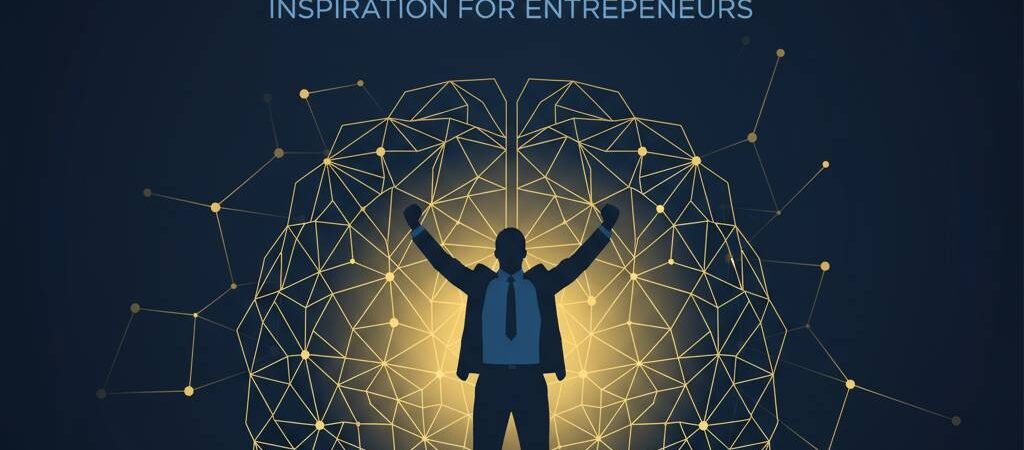Last Updated on October 15, 2025 by Vasid Qureshi CEO & Founder, Strategic Business Contributor | Published: May 27, 2025
Introduction
The entrepreneurial journey demands more than strategic brilliance or market insight—it requires a fundamental transformation in how we think, learn, and adapt. Research reveals that mindset serves as the primary differentiator between entrepreneurs who build sustainable ventures and those who struggle despite equal resources and opportunities. This comprehensive analysis explores the psychological foundations of elite performance and provides evidence-based strategies for cultivating the mental frameworks that drive entrepreneurial excellence.
The Scientific Foundation of Elite Mindset
Neuroplasticity and Performance Enhancement
Modern neuroscience demonstrates that the brain’s capacity for adaptation—neuroplasticity—directly impacts entrepreneurial performance. Research indicates that elite performers develop different neural pathways than average achievers, particularly in areas governing decision-making under pressure, emotional regulation, and strategic thinking. Professor Margriet Sitskoorn notes that “your brain constantly needs to adapt to changes in the world around you. Neuroplasticity ensures that the brain’s structure and functions change immediately.”
This neurological flexibility enables entrepreneurs to:
- Process complex information faster during critical decision-making moments
- Adapt cognitive strategies based on changing market conditions
- Develop enhanced stress resilience through repeated exposure to high-stakes situations
- Strengthen neural pathways that support creative problem-solving and innovation
The Psychology of Growth Mindset
Carol Dweck’s groundbreaking research on growth versus fixed mindsets reveals fundamental differences in how entrepreneurs approach challenges, setbacks, and learning opportunities. Individuals with growth mindsets believe that abilities can be developed through dedication and effort, while those with fixed mindsets view talents as static traits.
Key Research Findings:
- Students with growth mindsets outperform fixed-mindset peers by 9-17% in academic settings
- 80% of senior executives agree that employee growth mindsets contribute to revenue growth
- Growth mindset training leads to increased entrepreneurial action compared to control groups
The Five Psychological Pillars of Elite Entrepreneurial Mindset

1. Self-Efficacy and Internal Locus of Control
Research consistently identifies self-efficacy—belief in one’s capability to execute entrepreneurial tasks successfully—as a primary predictor of venture success. Entrepreneurs with high self-efficacy demonstrate increased motivation, persistence, and willingness to pursue ambitious objectives.
Internal locus of control complements self-efficacy by fostering accountability. Entrepreneurs who believe their actions determine outcomes rather than external factors show greater resilience during market downturns and more proactive problem-solving behaviors.
2. Resilience and Grit
Psychological resilience—the capacity to recover from adversity—combined with grit enables entrepreneurs to sustain effort despite prolonged challenges. Research demonstrates that resilient entrepreneurs view failures as learning opportunities rather than personal inadequacies, leading to faster recovery and strategic adaptation.
Components of Entrepreneurial Resilience:
- Cognitive flexibility: Reframing setbacks as valuable market feedback
- Emotional regulation: Managing stress and uncertainty without compromising decision quality
- Behavioral adaptation: Modifying strategies based on new information while maintaining core vision
- Social resource utilization: Leveraging mentor relationships and peer networks for guidance and support
3. Adaptive Intelligence
Elite entrepreneurs exhibit adaptive thinking that treats goals as hypotheses to be tested rather than fixed mandates. A 2024 study of 6,000 leaders found that highly adaptable leaders ranked in the 90th percentile of effectiveness, while rigid leaders fell below the 20th percentile.
This adaptive approach enables entrepreneurs to:
- Pivot strategies based on market feedback without abandoning core objectives
- Integrate new information quickly into existing business models
- Balance persistence with strategic flexibility when facing obstacles
- Maintain long-term vision while adjusting tactical execution
4. Process-Focused Excellence
High-performing entrepreneurs concentrate on controllable daily activities that drive long-term goals rather than obsessing over immediate outcomes. This process orientation reduces anxiety while improving decision quality, as entrepreneurs focus on inputs they can directly influence.
Process-Focused Strategies:
- Daily metric tracking: Monitoring customer outreach, product development progress, and team performance indicators
- Weekly strategic reviews: Assessing process effectiveness and making tactical adjustments
- Monthly goal alignment: Ensuring daily activities support quarterly and annual objectives
- Quarterly strategic evaluation: Reviewing market position and competitive advantages
5. Empowerment-Oriented Leadership
Research shows that empowered employees are 67% more willing to exceed expectations and 21% more productive than their micromanaged counterparts. Elite entrepreneurs understand that sustainable growth requires developing others’ capabilities rather than controlling all decisions personally.
Practical Implementation Framework
Phase 1: Foundation Building (Months 1-3)
Mindset Assessment and Baseline Establishment
- Complete validated psychological assessments measuring growth mindset orientation, resilience quotient, and self-efficacy levels
- Identify specific cognitive biases that may impact decision-making quality
- Establish baseline metrics for stress management, learning agility, and adaptive capacity
- Create accountability systems with mentors or peer groups for ongoing development
Fundamental Skill Development
- Implement daily meditation or mindfulness practices to enhance emotional regulation and cognitive clarity
- Develop systematic approaches to failure analysis, treating setbacks as data rather than personal shortcomings
- Practice reframing challenging situations as learning opportunities through structured reflection exercises
- Build consistent feedback-seeking habits with customers, team members, and advisors
Phase 2: Advanced Integration (Months 4-8)
Strategic Application of Mental Models
- Apply Jeff Bezos’s 70% decision rule to balance information gathering with action bias
- Use inversion thinking to identify potential failure points before they become critical problems
- Develop scenario planning capabilities that account for multiple possible outcomes and required responses
- Create decision frameworks that incorporate both analytical and intuitive inputs
Leadership Development Through Empowerment
- Transition from direct control to outcomes-based management approaches
- Develop team members’ decision-making capabilities through structured delegation and coaching
- Create systems that enable rapid communication and coordination without centralized bottlenecks
- Build organizational resilience through distributed expertise and redundant capabilities
Phase 3: Mastery and Optimization (Months 9-12)
Performance System Integration
- Develop sophisticated early warning systems for market changes, competitive threats, and internal challenges
- Create automated processes that free cognitive resources for high-level strategic thinking
- Build personal and organizational learning loops that accelerate adaptation to new information
- Establish sustainable practices for maintaining peak cognitive and emotional performance
The Daily Architecture of Elite Performance
Morning Optimization Rituals
Successful entrepreneurs consistently begin each day with structured routines that activate cognitive function and establish psychological control. Research demonstrates that morning rituals serve multiple neurological functions: they reduce decision fatigue, activate prefrontal cortex function when mental energy peaks, and create momentum through early accomplishments.
Evidence-Based Morning Components:
- Strategic planning session (20-30 minutes): Review priorities, visualize successful outcomes, identify potential obstacles
- Physical activation (15-20 minutes): Exercise increases BDNF production, supporting neuroplasticity and cognitive function
- Mindfulness practice (10-15 minutes): Meditation enhances emotional regulation and reduces stress hormone production
- Learning investment (15-20 minutes): Reading or skill development that compounds over time
Evening Reflection and Planning
Elite entrepreneurs use evening routines to consolidate learning, process emotional experiences, and prepare for optimal next-day performance. This practice leverages the brain’s natural consolidation processes during sleep while reducing anxiety about future challenges.
Measuring Progress and Maintaining Momentum
Quantitative Assessment Metrics
Cognitive Performance Indicators:
- Decision-making speed and accuracy under pressure
- Problem-solving creativity and solution generation
- Learning velocity in new domains
- Stress resilience during challenging periods
Behavioral Performance Indicators:
- Consistency in executing fundamental business activities
- Quality and frequency of strategic communications
- Team engagement and development outcomes
- Customer satisfaction and retention metrics
Continuous Optimization Strategies
Elite mindset development requires ongoing refinement rather than one-time implementation. Consultants who consistently work on their mindset show 78% higher likelihood of earning $150,000+ annually compared to those who don’t prioritize mental development.
Ongoing Development Practices:
- Monthly mentor sessions: Regular guidance from experienced entrepreneurs who can provide perspective and challenge assumptions
- Quarterly 360-degree feedback: Comprehensive assessment from team members, customers, and peers on leadership effectiveness and blind spots
- Annual strategic retreats: Extended periods for deep reflection, goal refinement, and strategic planning
- Continuous learning investment: Commitment to developing new capabilities through courses, conferences, and expert consultation
Transformational Case Studies in Elite Mindset Application
Microsoft’s Cultural Renaissance Under Satya Nadella
When Satya Nadella became Microsoft’s CEO, he implemented a fundamental shift from a “know-it-all” to a “learn-it-all” culture. This transformation exemplifies adaptive thinking in practice—rather than defending existing market positions, Microsoft embraced continuous learning and strategic pivoting. The results included significant gains in cloud computing market share and successful entry into artificial intelligence markets.
Key Implementation Strategies:
- Leadership modeling: Nadella personally demonstrated growth mindset behaviors, admitting mistakes and highlighting learning opportunities
- Systems alignment: Performance review processes emphasized learning and improvement over individual achievement
- Cultural reinforcement: Company communications consistently celebrated experimentation and intelligent risk-taking
- Strategic integration: Business strategies incorporated learning loops and rapid iteration cycles
Reid Hoffman’s LinkedIn Network Effects Strategy
LinkedIn founder Reid Hoffman demonstrates process-focused excellence through his systematic approach to network building and platform development. Rather than focusing solely on user acquisition numbers, Hoffman emphasized creating sustainable value creation processes that would compound over time.
Process Excellence Applications:
- Systematic relationship building: Consistent investment in professional relationships regardless of immediate returns
- Data-driven iteration: Regular analysis of user behavior patterns to inform product development decisions
- Long-term value optimization: Focus on lifetime customer value rather than short-term engagement metrics
- Ecosystem thinking: Building platform capabilities that create value for all stakeholders, not just the company
The Compound Effect of Elite Mindset Integration
Research demonstrates that elite mindset characteristics work synergistically to create performance advantages that multiply over time. When entrepreneurs develop self-efficacy, resilience, adaptive thinking, process focus, and empowerment orientation simultaneously, they create what researchers call “deliberate practice“—the ability to improve systematically rather than relying on random breakthroughs.
Multiplier Effects Include:
- Accelerated learning: Growth mindset enhances knowledge acquisition speed and retention quality
- Enhanced decision-making: Reduced cognitive biases and improved information processing under pressure
- Increased resilience: Faster recovery from setbacks and greater emotional stability during uncertainty
- Improved leadership effectiveness: Higher team engagement, productivity, and innovation rates
- Sustainable performance: Maintained high standards across different market conditions and growth phases
Future Directions and Advanced Applications
Neurotechnology Integration
Emerging neurotechnology applications offer unprecedented opportunities for entrepreneurs to optimize cognitive performance through real-time brain training and biofeedback systems. These technologies can provide objective measures of mental state and targeted interventions for improvement.
Personalized Mindset Development
Future applications may include AI-driven assessment tools that identify individual cognitive patterns and provide customized development programs. These systems could optimize training intensity, timing, and methodology based on personal learning styles and neural response patterns.
Conclusion: The Continuous Evolution of Elite Mindset
Cultivating an elite entrepreneurial mindset represents not a destination but a continuous journey of intentional development and strategic application. The neuroscience is clear: our brains possess remarkable capacity for adaptation and optimization throughout our lives. The psychology is proven: specific mental frameworks dramatically impact performance outcomes. The examples are abundant: successful entrepreneurs consistently demonstrate these characteristics across industries and market conditions.
The question facing aspiring elite performers isn’t whether they possess innate talent or favorable circumstances—it’s whether they commit to the systematic development of mental frameworks that enable sustained high performance. Elite mindset becomes available to anyone willing to engage in the deliberate, consistent practices required to unlock their cognitive and emotional potential.
Your transformation begins with three fundamental commitments:
- Embrace continuous learning as a core identity rather than occasional activity
- Develop systematic approaches to challenges, setbacks, and opportunities
- Build supportive environments that reinforce growth-oriented behaviors and provide accountability for continued development
The path to elite performance requires discipline, patience, and unwavering commitment to improvement. But for entrepreneurs willing to invest in their mental development, the rewards extend far beyond business success—they include the deep satisfaction of operating at your highest potential and creating value that extends beyond yourself to everyone you serve.
Elite mindset isn’t reserved for a chosen few—it’s a learnable, trainable set of capabilities that can transform how you think, decide, and act in every aspect of your entrepreneurial journey. The research provides the roadmap. The examples demonstrate the possibilities. The only remaining question is your commitment to begin.
Suggested reads:
- Unlocking the Secrets of the Elite Mindset: Your Daily Inspiration
- Neuroscience-Backed Blueprint for an Elite Mindset


